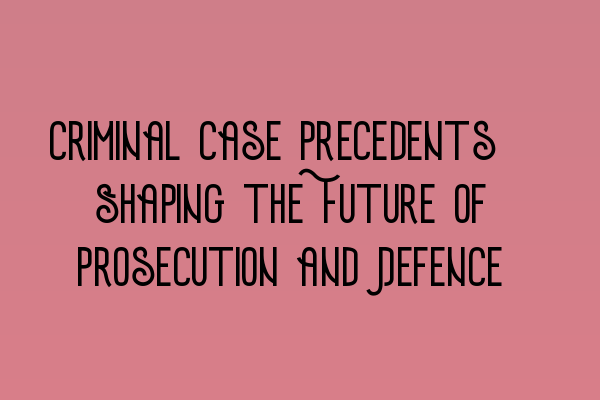Criminal Case Precedents: Shaping the Future of Prosecution and Defence
Welcome to the blog of SQE Criminal Law & Practice Law UK! In today’s post, we will be exploring the fascinating world of criminal case precedents and how they play a crucial role in shaping the future of prosecution and defence.
What are Criminal Case Precedents?
Criminal case precedents are previous court decisions that establish legal principles and serve as binding or persuasive authorities for future similar cases. They are an essential part of our legal system, ensuring consistency, fairness, and predictability in the application of the law.
By analyzing past cases and the reasoning behind the decisions, legal professionals can anticipate the outcomes of similar cases and strategize their arguments accordingly. This deep understanding of criminal case precedents gives lawyers a significant advantage in building strong cases for their clients.
The Importance of Criminal Case Precedents
1. Establishing Legal Principles: Criminal case precedents help establish legal principles that guide the interpretation and application of the law. They provide a framework for judges, prosecutors, and defence lawyers to analyze and evaluate the facts of a case.
2. Ensuring Consistency: Precedents ensure consistency in the interpretation and application of the law across different cases. They help avoid contradictory decisions and promote fairness and equality before the law.
3. Predictability: Criminal case precedents provide a level of predictability in legal outcomes. They allow legal professionals to anticipate the reasoning of judges, develop persuasive arguments, and advise clients on the potential outcomes of their cases.
4. Evolving the Law: Precedents are not set in stone. They can evolve and adapt to societal changes and new legal arguments. Over time, criminal case precedents contribute to the evolution of the law and reflect the needs and values of society.
How Precedents Shape the Future
1. Influencing Future Decisions: Criminal case precedents have a significant impact on future court decisions. Judges look to previous cases to guide their reasoning and determine appropriate outcomes. A strong precedent can shape the direction of the law and influence how future cases are decided.
2. Setting Legal Standards: Precedents establish legal standards that help define the boundaries of acceptable conduct. They guide prosecutors in deciding which charges to pursue and provide defence lawyers with valuable insights into effective defence strategies.
3. Creating Precedential Authority: Some criminal case precedents have more weight and authority than others. Landmark cases or decisions from higher courts can set strong precedents that must be followed by lower courts in similar cases.
4. Challenging Precedents: Precedents are not infallible and can be challenged. Lawyers can argue that a precedent should be distinguished, overruled, or reversed based on new legal arguments or changes in societal norms. Such challenges play a crucial role in the development and refinement of the law.
Conclusion
Understanding criminal case precedents is essential for both prosecutors and defence lawyers. It allows them to analyze previous decisions, anticipate legal outcomes, and build strong cases for their clients. Precedents shape the future of prosecution and defence by establishing legal principles, ensuring consistency, and allowing the law to evolve.
For more information on SQE 1 and SQE 2 exam preparation, check out our related articles:
- SQE 1 Practice Exam Questions
- SQE 1 Practice Mocks FLK1 FLK2
- SQE 2 Preparation Courses
- SQE 1 Preparation Courses
- SRA SQE Exam Dates
Stay tuned for more insightful articles on criminal law and practice from SQE Criminal Law & Practice Law UK!
